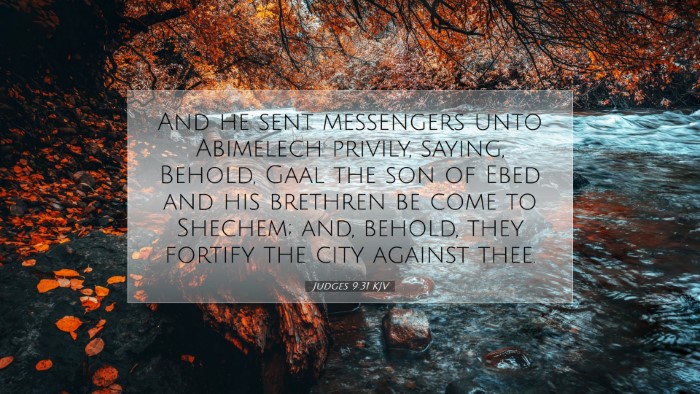Bible Commentary on Judges 9:31
Verse Reference: Judges 9:31 - "And he sent messengers unto Abimelech privily, saying, Behold, Gaal the son of Ebed and his brethren be come to Shechem; and, behold, they fortify the city against thee."
Introduction
This passage from the Book of Judges presents a critical moment in the story of Abimelech, the son of Gideon, as he contends for power in Shechem. It serves as an illustration of the political intrigue and the tensions inherent in leadership and community governance. Drawing on insights from public domain commentaries, we explore the nuances of this verse and its implications for understanding leadership in a biblical context.
Contextual Background
Before delving into the commentary, it is essential to understand the historical and literary context of this passage. Following the death of Gideon, Israel faced a period of instability. Abimelech, seeking to establish himself as king, leveraged the loyalty of his mother’s family in Shechem. The verse indicates a growing opposition to his rule through the figure of Gaal, highlighting the presence of dissent and unrest within the community.
Commentary Insights
Abimelech's Political Maneuverings
Matthew Henry underscores the cunning nature of Abimelech’s governance. This message, sent privily, reveals his awareness of the mounting threats against him. Henry elaborates that the spirit of self-preservation drives Abimelech to act covertly. This reflects a broader biblical principle regarding the dangers of seeking power without integrity and respect for the community’s well-being.
Gaal’s Challenge
Albert Barnes comments on the significance of Gaal's entry into the narrative. He suggests that Gaal, through assertions of leadership and fortifications of the city, symbolizes the local resistance against perceived tyranny. This embodies the tension between an established ruler and emerging leaders who seek to rally the populace under a different banner. Barnes highlights that Gaal’s rise signals hope for a populace weary of Abimelech’s dubious legitimacy.
The Nature of Leadership
Adam Clarke engages with the themes of leadership and rebellion. He articulates that Abimelech represents a flawed model of leadership predicated on violence and manipulation. In contrast, Gaal’s challenge can be interpreted as a yearning for righteous governance, whereby the community desires a leader who truly represents their interests. Clarke invites readers to reflect on the qualities that define godly leadership—integrity, humility, and genuine concern for the people's welfare.
Theological Implications
This passage raises significant theological questions regarding authority, justice, and the nature of God’s providence. The narrative illustrates that leadership is not merely about power but about accountability to those one leads. This serves as a reminder to both modern leaders and congregations of the ramifications of their choices and the moral dimensions of their governance.
- God’s Sovereignty: The events unfold within the framework of God’s overarching sovereignty. Despite Abimelech’s dubious methods, God permits these uprisings to demonstrate the consequences of turning from divine guidance.
- Human Agency: The actions of Gaal and Abimelech showcase human agency in the unfolding of history. While God remains sovereign, individuals are called to act righteously and uphold justice among their peers.
- Covenant Community: This episode serves as a cautionary tale about the fracture within the covenant community. It reflects the division that arises when leaders fail to uphold the values of the covenant.
Application for Modern Readers
For pastors, students, and scholars, this passage serves as a profound reflection for contemporary contexts. The political maneuverings and challenges to authority mirror the complexities faced in modern leadership roles—whether in ecclesiastical settings or broader societal governance. Key applications include:
- Assessing Leadership Styles: Leaders are called to evaluate their own motives and methods in relation to their communities, ensuring they align with biblical principles.
- Engaging with Dissent: Understanding and responding to dissent within a community can lead to growth and refinement of leadership practices.
- Promoting Justice: Leaders must strive for justice and integrity, recognizing their accountability before God and their communities.
Conclusion
Judges 9:31 captures a pivotal point in the narrative of Abimelech, showcasing the intricacies of leadership and the dynamics of power within the community. Drawing insights from Matthew Henry, Albert Barnes, and Adam Clarke enriches our understanding of this passage, encouraging the faithful to reflect on the principles of godly leadership and the responsibilities that accompany authority. As believers, may we aspire to lead with integrity and humility, mindful of the weight of our choices and the ultimate sovereignty of God in the unfolding of history.


